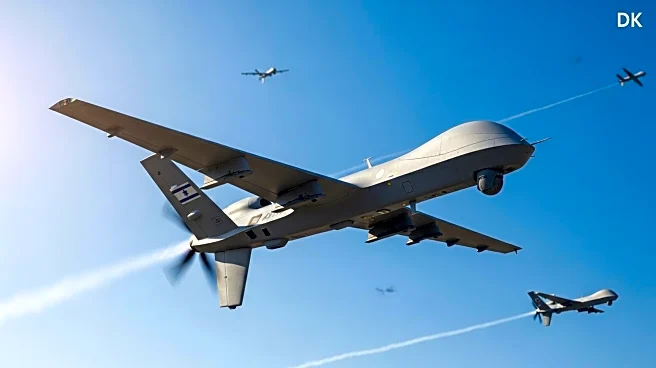What's Happening?
On October 7, 2023, Israel faced a significant security breach when Hamas militants launched a surprise attack, resulting in the deaths of 1,200 Israelis and the capture of 251 hostages. This event marked a turning point for Israel, which has since emerged as a dominant military force in the Middle East. Following the attack, Israel conducted a series of strategic military operations against Hezbollah in Lebanon, Iran, and Syria, significantly weakening these adversaries. Hezbollah's capabilities were diminished after a successful Israeli intelligence operation, and Iran's military infrastructure was targeted in a series of strikes. Syrian leader Bashar al-Assad fled to Russia as Turkish-backed rebels advanced. Despite these military successes, Israel's actions have led to increased global isolation, with rising anti-Israel sentiment and a decline in support from traditional allies.
Why It's Important?
The developments following the October 7 attack have reshaped the geopolitical landscape of the Middle East. Israel's military actions have not only neutralized immediate threats but have also altered power dynamics in the region. However, the aggressive military strategy has come at a cost, as international criticism and pro-Palestinian sentiment have grown. The conflict has strained Israel's relationships with key allies, including the United States, where public opinion has shifted against the Israeli government. The situation has also impacted Israel's diplomatic efforts, particularly with Arab nations, as the normalization of relations has stalled. The broader implications of these events highlight the complex balance between military strength and diplomatic relations in maintaining regional stability.
What's Next?
Israel faces the challenge of navigating its newfound military dominance while addressing the diplomatic fallout from its actions. Ongoing negotiations in Cairo aim to establish a peace process, but the outcome remains uncertain. Israel must work to either advance the peace process or strategically position Hamas as the obstacle to peace. The international community will continue to monitor Israel's actions, and the country's ability to manage its relationships with both regional and global powers will be crucial in shaping future developments.
Beyond the Headlines
The ethical and humanitarian implications of Israel's military strategy are significant. The high civilian casualties in Gaza and the restriction of humanitarian aid have drawn widespread condemnation. These actions raise questions about the proportionality and morality of military responses in conflict zones. Additionally, the shifting public opinion in the United States and other Western countries reflects a growing divide in perceptions of the Israeli-Palestinian conflict, which could influence future foreign policy decisions.











